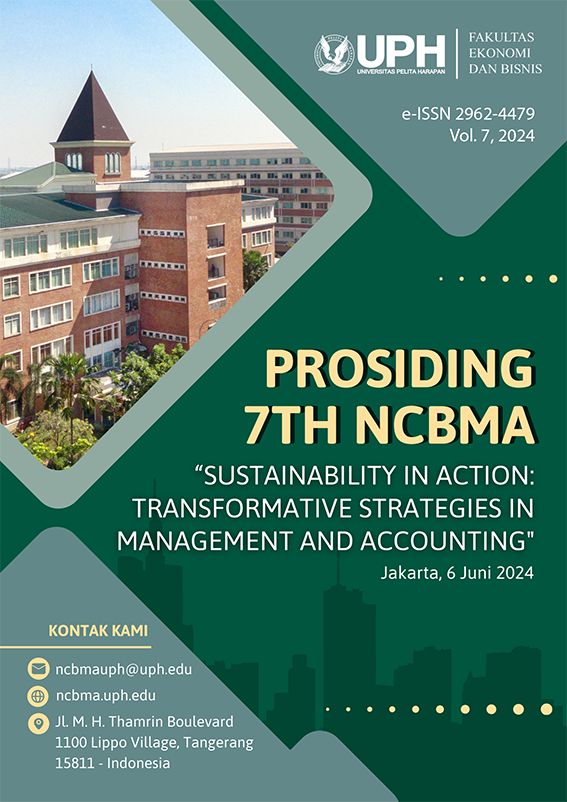UNLOCKING GENERATION Z’S MINDS ON STOCK INVESTMENT: DETERMINANTS OF MOBILE STOCK INVESTMENT APPLICATION ADOPTION
Keywords:
Generation Z, Mobile stock investment applications, Perceived Financial Benefits, Perceived Financial Risk, Financial literacy, FinfluencersAbstract
Generation Z is the youngest generation entering the stock markets. Their participation may break or make the future of stock investment. This study aims to investigate the determinants of the adoption of mobile stock investment applications by Generation Z. The study provides new insights into the minds of Generation Z on how their perception of financial risks and benefits, their financial literacy, and financial influencers affect their adoption of mobile stock investments applications in the context of Indonesia. The study used survey questionnaires as research instruments with Partial Least Square-Structural Equation Modeling (PLS-SEM) as the quantitative data analysis tool. This study involved 253 Generation Z who are active students at private universities in Java and Sumatra islands (the two most populous islands in Indonesia). The study found that perceived benefits, perceived technology security, and financial literacy affect the adoption of mobile stock investment applications. Finfluencers and Perceived financial risks were not found to have a positive influence on the adoption of mobile stock investment applications among Generation Z.
References
Ahmed, K. (2023, September 14). Unlocking the Investor’s Mind: A Deep Dive into Stock Investment App Usage in Indonesia. TGM Research. https://tgmresearch.com/stock-investment-app-usage-case-study-in-indonesia.html
Aprilia, C., & Amalia, R. (2023). Perceived Security and Technology Continuance Theory: An Analysis Of Mobile Wallet Users’ Continuance Intention. Global Business Review, 0(0). https://doi.org/10.1177/09721509221145831
Bland, E., Changchit, C., Changchit, C., Cutshall, R., & Pham, L. (2024). Investigating the components of perceived risk factors affecting mobile payment adoption. Journal of Risk and Financial Management, 17(6), 216. https://doi.org/10.3390/jrfm17060216
Biro Pusat Statistik. (2024). Jumlah Penduduk Menurut Wilayah, Klasifikasi Generasi, Dan Jenis Kelamin, Di Indonesia - dataset - sensus penduduk 2020 - Badan Pusat Statistik. WEB SENSUS BPS - Badan Pusat Statistik Republik Indonesia. https://sensus.bps.go.id/topik/tabular/sp2020/2
Chin, A. G., Harris, M. L., & Brookshire, R. G. (2020). An empirical investigation of intent to adopt mobile payment systems using a trust-based extended valence framework. Information Systems Frontiers, 24(1), 329-347. https://doi.org/10.1007/s10796-020-10080-x
Chong, L., Ong, H., and Tan, S. (2021). Acceptability of mobile stock trading application: A study of young investors in Malaysia. Technology In Society, 64, 101497. https://doi.org/10.1016/j.techsoc.2020.101497
Espeute, S., & Preece, R. (2024). The Finfluencer Appeal: Investing in the Age of Social Media Industry Future. https://rpc.cfainstitute.org/-/media/documents/article/industry-research/finfluencer-report.pdf
Fan, L. (2021). Mobile investment technology adoption among investors. International Journal of Bank Marketing, 40(1), 50-67. https://doi.org/10.1108/ijbm-11-2020-0551
Firmansyah, E.A.; Masri, M.; Anshari, M.; Besar, M.H.A. (2023). Factors Affecting Fintech Adoption: A Systematic Literature Review. FinTech, 2, 21-33. https://doi.org/10.3390/fintech2010002
Havidz, I, L, H., Aima, M, H., Wiratih, H, W, R. (2018). Determinants of Intention to Recommend WeChat Mobile Payment Innovation in China to be Implemented in Indonesia. International Journal of Advanced Engineering Research and Science (IJAERS), 5(7), https://dx.doi.org/10.22161/ijaers.5.7.38
Hair, H.F., Hult, G.T.M., Ringle, C.M., & Sarstedt, M. (2022). A Primer on Partial Least Squares Structural Equation Modelling (PLS-SEM) (3rd ed.). Thousand Oaks, CA: Sage
Henseler, J., Ringle, C. M., & Sarstedt, M. (2015). A new criterion for assessing discriminant validity in variance-based structural equation modeling. Journal of the Academy of Marketing Science, 43(1), 115-135. https://doi.org/10.1007/s11747-014-0403-8
IDN Media (2024). Indonesia Gen Z Report 2024. IDN Research Institute. https://cdn.Idntimes.com/content-documents/Indonesia-gen-z-report-2024.pdf
Institute, N. C. (2023). Gen Z and Investing: Social Media, Crypto, FOMO, and Family. https://doi.org/10.56227/23.1.15
Johri, A., Wasiq, M., Kaur, H., Asif, M. (2023). Assessment of users’ adoption behaviour for stock market investment through online applications, Heliyon 9 (2023), https://doi.org/10.1016/j.heliyon.2023.e19524
Karp, E. (2023, September 21). A Crucial Challenge For Manufacturers: Attracting””And Retaining””Generation Z. Forbes. https://www.forbes.com/sites/ethankarp/2023/09/19/a-crucial-challenge-for-manufacturers-attracting-and-retaining-generation-z/?sh=14a72f231ce8
Liu, Y. (2023). The Impact of Social Media Influencers on Generation Z Online Consumer Behavior (Take the Social Media Platform Douyin as an Example). Advances in Economics, Management and Political Sciences, 41(1), 19-24. https://doi.org/10.54254/2754-1169/41/20232026
Nair, P. S., Shiva, A., Yadav, N., & Tandon, P. (2022). Determinants of mobile apps adoption by retail investors for online trading in emerging financial markets. Benchmarking: An International Journal, 30(5), 1623-1648. https://doi.org/10.1108/bij-01-2022-0019
Nguyen, Y. T. H., Tapanainen, T., & Nguyen, H. T. T. (2022). Reputation and its consequences in fintech services: the case of mobile banking. International Journal of Bank Marketing, 40(7), 1364-1397. https://doi.org/10.1108/ijbm-08-2021-0371
Oliveira, T., Thomas, M., Baptista, G., and Campos, F. (2016). Mobile payment: Understanding the determinants of customer adoption and intention to recommend the technology. Computers in Human Behavior, 61, 404-414. doi: 10.1016/j.chb.2016.03.030
PaÅ¡iuÅ¡ienÄ—, I., Podviezko, A., MalakaitÄ—, D., ŽarskienÄ—, L., LiuÄvaitienÄ—, A., & MartiÅ¡ienÄ—, R. (2023). Exploring Generation Z’s investment patterns and attitudes towards greenness. Sustainability, 16(1), 352. https://doi.org/10.3390/su16010352
Petrosyan, A. (2023, August 30). Countries with the largest digital populations in the world as of January 2023. Statista; Statista. https://www.statista.com/statistics/262966/number-of-internet-users-in-selected-countries/
Sembel, J. S., Widjaja, A. W., & Antonio, F. (2024). An Empirical Analysis of Financial Literacy As Mediator For Stock Investment Intention Among University Students. ijbs.ipmi.ac.id. https://doi.org/10.32924/ijbs.v8i1.307
Shmueli, G., Sarstedt, M., Hair, J.F., Cheah, J.-H., Ting, H., Vaithilingam, S. and Ringle, C.M. (2019), "Predictive model assessment in PLS-SEM: guidelines for using PLSpredict", European Journal of Marketing, Vol. 53 No. 11, pp. 2322-2347. https://doi.org/10.1108/EJM-02-2019-0189
Tai, Y. and Ku, Y. (2013) Will Stock Investors Use Mobile Stock Trading? A Benefit-Risk Assessment Based on a Modified UTAUT Model. Journal of Electronic Commerce Research, 14, 67-84.
Yusup, A. K., Hangdiyanto, C. (2023). Unlocking Financial Literacy in Generation Z: Are Sociodemographic Factors the Key? Petra International Journal of Business Studies, 6(2), 193-200. https://doi.org/10.9744/petraijbs.6.2.193-200
Downloads
Published
Issue
Section
License
Copyright (c) 2024 Jacquelinda Sandra Sembel

This work is licensed under a Creative Commons Attribution-ShareAlike 4.0 International License.

